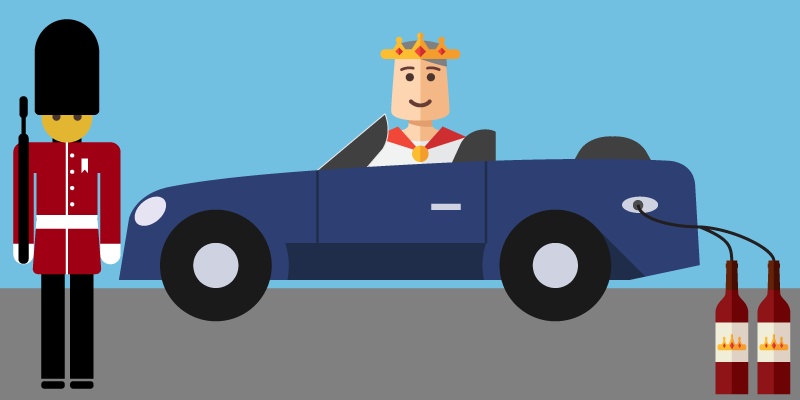In the long list of “things princes have that you don’t,” you can add one more: wine-powered car.
In fact it’s Prince Charles’ 38 year-old DB5 Aston Martin (a 21st birthday present from The Queen, who was debating between that and a “Cheese of the Month” club membership). Back in 2008, The Prince of Wales had it converted to run almost entirely on wine-derived ethanol, and he’s been quietly puttering around in it ever since.
Apparently the use of wine-derived bioethanol isn’t a gimmick, something designed to make something awesome seem even awesomer. It’s actually kind of beautifully practical. The EU has strict regulations about its wine industries—kind of a big deal since EU member states account for about two-thirds of the world’s wine production. According to one of the regulations, excess wine is actually not allowed to be sold on the market.
Rather than discard—or chug—it, they’ve been able to convert it into bioethanol, capable of fueling cars, even princely ones. And the way the wine’s converted is actually pretty simple: distillation. The same way a whiskey-maker will essentially brew a “beer” and then distill it (or separate the alcohol out by heating it to specific evaporation temps), a biofuel company—world-leading Gloucester-based Green Fuels—took an excess of 8,000 liters of surplus white wine and distilled it into near-pure ethanol (99.8%). A little extra alcohol collected from local cheesemakers (note to dairy lovers: you can extract alcohol from fermented whey) and the fuel was ready. Not that the Prince’s car is all wine and cheese: it runs on a mixture of 85% bioethanol and 15% actual gasoline. But still. Better than most.
But beyond, just, endless bragging rights (“Oh, you went to the petrol station today? I fueled my car at a vineyard…”), the wine fuel actually helps the Prince and Royal Family in its efforts to travel conscientiously, reducing emissions through use of ground transportation and alternative fuels. Charles’ Audi, Range Rovers, and Jaguars have been converted to run on cooking oil biodiesel.
So yes, it turns out you can do something good for the environment while speeding down the highway in your vintage Aston Martin, possibly while wearing a crown.

